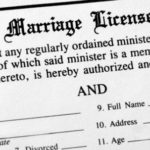Can Unmarried People Sue for Wrongful Death in Texas?
Common Law Marriage and Wrongful Death

You don’t need a marriage license in Texas to be legally married and bring wrongful death claims
If a couple has not gone through a ceremonial marriage or obtained a marriage license, and one dies through the negligence of another, the survivor can bring claims for wrongful death if a common law marriage existed. Many people believe that a Texas marriage is valid only if they obtained a marriage certificate and were married by clergy or a judge. However, if the couple met the requirements of common law or informal marriage, that marriage is valid in Texas for all purposes even wrongful death or inheritance claims.
What is a Common Law Marriage in Texas?
When a couple does three things, they are considered legally married – agree they are married, live together as husband and wife, and hold themselves out as being married.
- Agreement to be married. This requirement is simple. The couple simply agrees with each other that they are now married and consider each other as their spouse. Certainly, after the death of one of the couple, this agreement can be difficult to prove so the law allows the agreement to be presumed when the other two requirements are met.
- Live Together. Many people live together who are not married. However, this element can be shown if the couple lived as if they were married. Any number of actions can show they lived together as if married such as buying property together, using joint bank accounts, sharing cars, and having and raising children. These are just a few examples of living together as husband and wife. There can be an infinite number of actions proving that a couple lived as if married.
- Holding Out. This element simply means telling other people or the world that you are married. It can be as simple as introducing each other as husband, wife, or spouse. Often, the proof is shown by one of the couples listed the other as a spouse on life insurance or health insurance.
If a surviving common-law spouse can show that the couple had lived together and held out to others that they are married, then the agreement to be married can be presumed. Once a common law marriage is established in Texas, it can only be terminated through a legal divorce proceeding. A such, if your common law spouse was killed through the negligence of another person or company, you are entitled to bring wrongful death claims under the Workers Compensation Act as if you were formally married through a license and ceremony.
What if we broke up just before my common-law spouse was killed?
This is quite common – just as in the case of ceremonial marriages – many spouses have temporary separations while they work through issues. However, the marriage is still valid and recognized by law. You still have the right to bring wrongful death claims as a surviving spouse.
What if my common-law spouse left me and the kids and married somebody else before he was killed?
In this case, if the common law marriage was not terminated through divorce, you were still legally married at the time of the death and the second marriage would be considered invalid under Texas law. You would still be entitled to bring negligent death claims for yourself and/or the children.
What if my spouse had children from a prior marriage?
Even if your common law spouse had children from a prior marriage, Texas law still entitles you to bring wrongful death claims for your damages and losses or those of your children. Surviving spouses, children and parents of wrongful death victims are permitted to sue under the Wrongful Death Act. Furthermore, there are laws which are limited to the surviving spouse under the Texas Workers Compensation Act. A surviving spouse is entitled to death benefits if it occurred on the job with an employer covered by workers’ compensation. Moreover, if an employed covered by workers’ compensation is killed through gross negligence, the surviving spouse and children are entitled to bring additional claims for punitive damages.
What is the statute of limitations for wrongful death involving a common law spouse?
Since a common law marriage is just as legally valid as a ceremonial marriage, the statute of limitations is the same in other wrongful death claims. Generally, in Texas you must bring a wrongful death lawsuit within two years of the death of your spouse.
Why do I need a lawyer if I have a wrongful death claim as a common law spouse?
While your common law marriage is valid, those that caused your spouse’s death will challenge your claims and try to prove that you were not married and cannot bring them. This is often the case when a common law surviving spouse seeks compensation for the negligent death of their loved one. The challenge may come from the lawyers for the company that caused their death or lawyers for the insurance company. They will immediately work to challenge your claim of common law marriage to try to stop you from receiving your deserved compensation. Challenges may also come from lawyers for your spouse’s family members who are trying to get the proceeds instead of you. If your common law spouse was killed, you need to immediately start gathering evidence showing that you had a valid marriage and are entitled to bring claims under the Texas Wrongful Death Statute.
Get Help From an Experienced Houston Wrongful Death Lawyer.
Fleming Law has been handling wrongful death claims – including those involving common law marriages – for over 30 years. If you lost your common-law spouse due to the negligent conduct of another person or company, Fleming Law will provide you with a free consultation to discuss your options and the ways you can recover the compensation you and/ or your children are entitled to under Texas law. We handle injury and wrongful death claims throughout the entire state of Texas. Call today if you have any questions.

Brendan received his JD from South Texas College of Law and his MBA from Baylor University. He then began his legal career as in-house counsel for a publicly-traded company, advising on matters such as mergers and acquisitions, securities, compliance, and general corporate transactions. He then worked at a national law firm in which he represented commercial banks, private equity firms, and business owners in complex transactions before joining Fleming Law, Brendan uses his considerable knowledge of business-related matters by working on cases involving business law, real estate law, and contracts. Connect with me on LinkedIn








